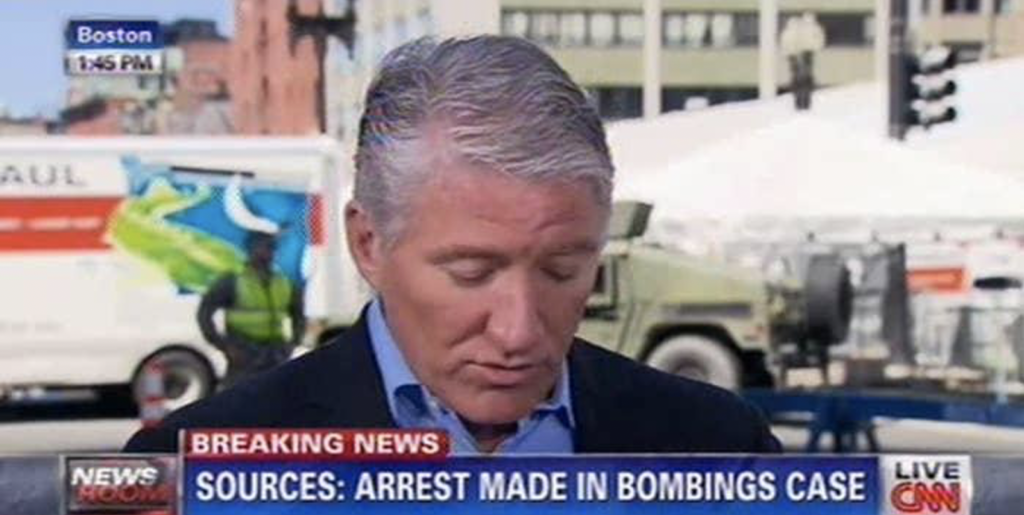
A crucial role the news media plays in a democractic society is the dissemination of reliable information during events of tragedy. Prior to 1980, during times of crisis and breaking news people in the United States would turn to one of the three major broadcast news networks–ABC, CBS, and NBC (Britannica). 1980 saw the creation of CNN which started the practice of the 24-hour news cycle model followed by MSNBC, CNBC, and Fox News (Britannica).
A major criticism of the 24-hour news cycle model is the need to constantly have something to report on at all times when compared to the traditional broadcast networks which report the news at a set time per day unless there is a case of major breaking news. This criticism is further exacerbated during times of breaking news. Within cable news networks, there appears to be a stronger emphasis placed on being the first to report a piece of information than in verifying that all information that is being broadcast to the public is accurate. This was made apparent during the reporting of the Boston Marathon Bombing in 2013.
New York Times Reporter David Carr published an article titled The Pressure to Be the TV News Leader Tarnishes a Big Brand six days following the Boston Marathon Bombing. In it he wrote:
“In a large-scale assault on public safety, the audience wants to know everything, right this second. Yes, they want you to be accurate, but the implicit promise of a 24-hour news service is that it will happen quickly. The pressure to produce is ratcheted up accordingly. (Carr, 2013)”
During the immediate coverage of the Boston Marathon Bombing, CNN reported a number of inaccuracies that not only led to people having incorrect information but also could have had much larger consequences. Two days following the shooting, CNN alongside several other news media organizations falsely reported that the FBI had made an arrest in regards to the bombing. This was later confirmed by the FBI to be false. A statement released from the FBI two days after the bombing reads:
“Contrary to widespread reporting, no arrest has been made in connection with the Boston Marathon attack. Over the past day and a half, there have been a number of press reports based on information from unofficial sources that has been inaccurate. Since these stories often have unintended consequences, we ask the media, particularly at this early stage of the investigation, to exercise caution and attempt to verify information through appropriate official channels before reporting” (FBI).
CNN reporter John King and Wolf Blitzer also both speculated on details of the bomber’s appearance before any official description of the suspect was released. John King referred to the subject as a “dark skin male” when there was not yet any official statement from law enforcement releasing that information (Goodman). The only attribution King gives is that he was “told by one of these sources who is a law enforcement official” (Goodman). The premature release of such information can lead to vigilante justice against individuals who are innocent. If citizens act on false information given to them via cable news networks it could lead to confusion and in the worst case violence. CNN has placed a large emphasis on having the most exclusive information and reporting it first, however this can lead to less strict measures being taken when it comes to authentication of such information.
From one perspective, during times of emergency and tragedy such as the events that occurred during the Boston Marathon Bombing, getting the general population information about what is going on as quickly as possible is a primary role of news media organizations such as CNN. CNN did not report any information that they believed to be untrue at the time. Their intentions appeared to be to update the public as soon as they knew something. On the other hand, accuracy and authentication of information are pillars of journalistic practice. When false information is reported not only are people misinformed but it also leads to a loss of credibility of the press in general as well as specific organizations such as CNN. From this perspective, it would be more beneficial for everyone if organizations such as CNN waited until the information they received could be authenticated through more official channels versus their own inside sources.
Discussion Questions:
- During times of breaking news, is the news media’s primary obligation to get information to the public as quickly as possible or to ensure that all information presented to the public has been fully authenticated through official channels? Why?
- Does the structure of the 24-hour cable news cycle when compared to traditional broadcast television create an environment where being the first to report a new piece of information take precedent over accuracy? Why or why not?
- Should journalists rely on inside sources they may have when covering emergency breaking news situations or should information only be reported if it is from an official source? Why?
Further Information:
Britannica. “The Era of the Miniseries.” Encyclopædia Britannica, Encyclopædia Britannica, Inc., www.britannica.com/art/television-in-the-United-States/The-era-of-the-miniseries.
Carr, David. “The Pressure to Be the TV News Leader Tarnishes a Big Brand.” New York Times, 21 Apr. 2013, www.nytimes.com/2013/04/22/business/media/in-boston-cnn-stumbles-in-rush-to-break-news.html.
FBI. “No Arrest Made in Bombing Investigation.” The Federal Bureau of Investigation, The U.S. Department of Justice, 17 Apr. 2013, https://archives.fbi.gov/archives/boston/press-releases/2013/no-arrest-made-in-bombing-investigation.
Goodman, Amy, et al. “ A Rush to Misjudgment: CNN Faulted for Racially Charged, Erroneous Reports on Boston Marathon Case.” Democracy Now!, Democracy Now! Independent Global News, 18 Apr. 2013, www.democracynow.org/2013/4/18/a_rush_to_misjudgment_cnn_faulted.